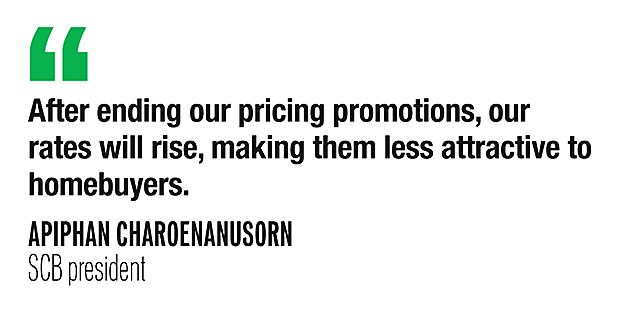
Siam Commercial Bank (SCB) will lower its retail borrowers' average debt-servicing ratio (DSR) to 50% amid rising uncertainties and in compliance with the central bank's requirement.
The bank's DSR varies depending on financial products and borrowers' risk profiles, and the highest ratio is now 70%, said president Apiphan Charoenanusorn.
Banks are working to set a single standard for DSR as requested by the Bank of Thailand as a tool for controlling risk and reducing stubborn household debt. The Monetary Policy Committee (MPC) last week expressed concerns about the swelling household debt.
Household debt ratio was a tad higher at 77.8% in the third quarter of last year, up from 77.7% in the previous quarter, but the MPC predicted the trend would continue into the final quarter of last year.
Mrs Apiphan said a lower DSR would help improve the bank's asset quality, though the bank's gross non-performing loan (NPL) ratio was at a satisfactory level of 2.85% at the end of last year.

The bank targets keeping the NPL ratio at 3% or lower this year.
SCB also plans to slow its housing loan growth this year and shift to high-yield lending products on the digital platform, Mrs Apiphan said. The bank will cancel some promotional pricing campaigns such as fixed rates for a teaser three-year period.
Mortgage demand is expected to weaken after the central bank's stringent loan-to-value ratio rule takes effect from April 1.
"After ending our pricing promotions, our rates will rise, making them less attractive to homebuyers," Mrs Apiphan said. "This should reduce our mortgage portfolio, which will become evident from next year."
SCB, the country's largest mortgage lender, targets flat growth in both new and outstanding housing loans this year. The bank aims for new housing loans worth 100 billion baht.
As of the end of December, the bank's total home-loan portfolio stood at 645 billion baht, rising 2.3% from the previous year and 0.1% from the end of September. Mortgage NPLs were around 2% at the end of 2018.
In another development, Mrs Apiphan said the bank's approval rate for unsecured loans has increased to around 40%, suggesting better qualifications of the loan applicants, particularly on the digital platform.
Under data-based analytics, SCB can control the NPLs of digital lending satisfactorily after the digital product was launched last year.